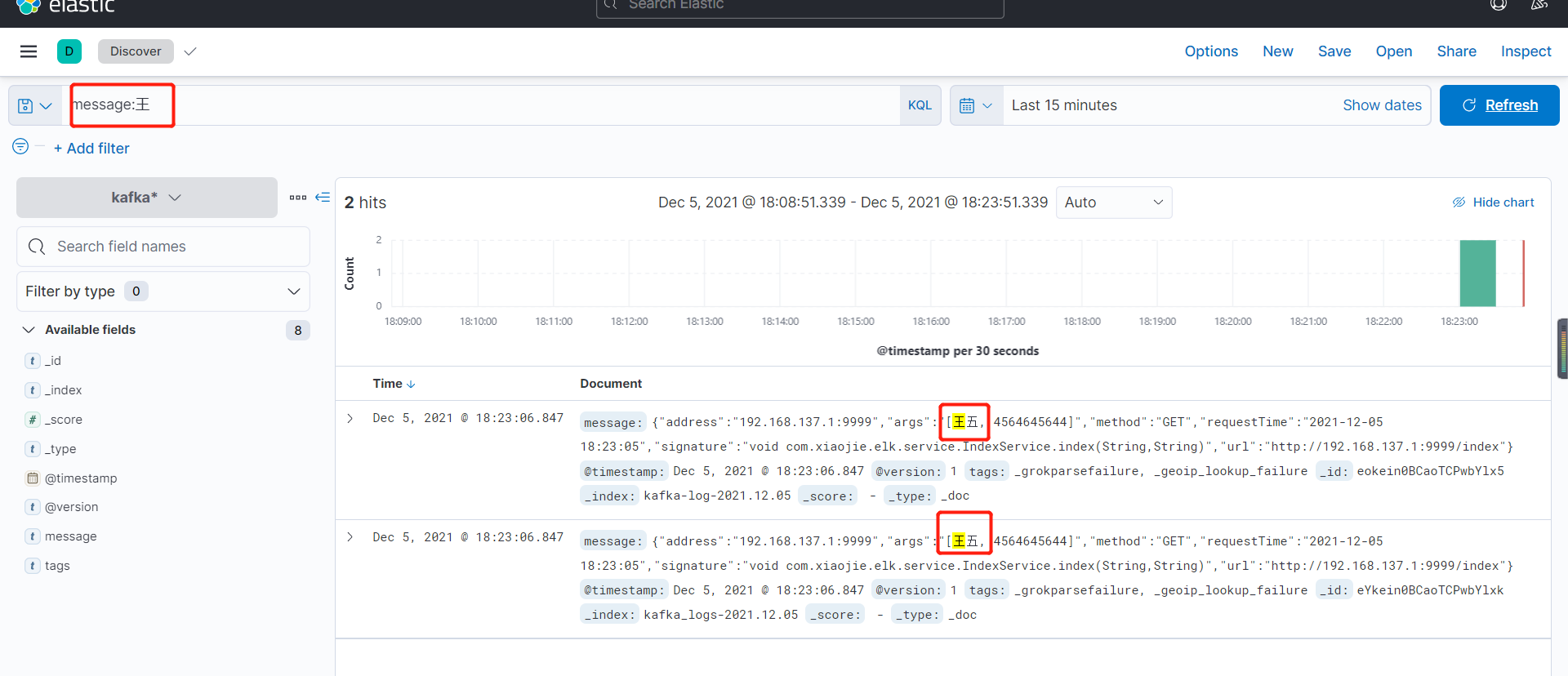catalogue
1, Disadvantages of traditional log collection
2, ELK collection system process
1, Disadvantages of traditional log collection
We know that most of us use logs to judge where the program reports errors, so that we can take a powerful medicine against the log. In a cluster environment, if hundreds of servers report errors, how can we find logs one by one? That'll embarrass us.
2, ELK collection system process
Based on Elasticsearch, Logstash and Kibana, the distributed log collection system can be realized. In addition, Kibana's visualization system can analyze the data. Um, it's really fragrant.

Create an AOP during the request process, intercept the request, and then start an asynchronous thread in the AOP method to send the message to Kafka (single machine or cluster). logstash receives Kafka's log, filters the message, and then sends it to the ElasticSearch system, and then searches and analyzes the log through the Kibana visual interface.
3, Build ELK system
Zookeeper Construction: Build zookeeper 3.7.0 cluster (Traditional & docker)_ Familiar snail blog - CSDN blog
Kafka Construction: Kafka cluster installation (traditional mode & docker mode) & springboot integration Kafka_ Familiar snail blog - CSDN blog
ElasticSearch setup:
Kibana Construction:
Kibana installation & integration ElasticSearch_ Familiar snail blog - CSDN blog
Logstash setup
Installation and use of LogStash (Traditional & docker)_ Familiar snail blog - CSDN blog
This article demonstrates that based on docker compose, all are stand-alone. For clusters, please refer to the above construction methods
1. Build docker compose
#Download the docker compose file sudo curl -L "https://github.com/docker/compose/releases/download/1.29.2/docker-compose-$(uname -s)-$(uname -m)" -o /usr/local/bin/docker-compose #to grant authorization sudo chmod +x /usr/local/bin/docker-compose
2. Create directory
mkdir -p /usr/local/docker-compose/elk
3. Create the docker-compose.yml file in the above directory
version: '2'
services:
zookeeper:
image: zookeeper:latest
container_name: zookeper
ports:
- "2181:2181"
kafka:
image: wurstmeister/kafka:latest
container_name: kafka
volumes:
- /etc/localtime:/etc/localtime
ports:
- "9092:9092"
environment:
KAFKA_ADVERTISED_HOST_NAME: 192.168.139.160
KAFKA_ZOOKEEPER_CONNECT: zookeeper:2181
KAFKA_ADVERTISED_PORT: 9092
KAFKA_LOG_RETENTION_HOURS: 120
KAFKA_MESSAGE_MAX_BYTES: 10000000
KAFKA_REPLICA_FETCH_MAX_BYTES: 10000000
KAFKA_GROUP_MAX_SESSION_TIMEOUT_MS: 60000
KAFKA_NUM_PARTITIONS: 3
KAFKA_DELETE_RETENTION_MS: 1000
elasticsearch:
image: docker.elastic.co/elasticsearch/elasticsearch:7.15.2
restart: always
container_name: elasticsearch
environment:
- discovery.type=single-node #Single point start, not allowed in actual production
- "ES_JAVA_OPTS=-Xms512m -Xmx512m"
ports:
- 9200:9200
kibana:
image: docker.elastic.co/kibana/kibana:7.15.2
restart: always
container_name: kibana
ports:
- 5601:5601
environment:
- elasticsearch_url=http://192.168.139.160:9200
depends_on:
- elasticsearch
logstash:
image: docker.elastic.co/logstash/logstash:7.15.2
volumes:
- /data/logstash/pipeline/:/usr/share/logstash/pipeline/
- /data/logstash/config/logstash.yml:/usr/share/logstash/config/logstash.yml
- /data/logstash/config/pipelines.yml:/usr/share/logstash/config/pipelines.yml
restart: always
container_name: logstash
ports:
- 9600:9600
depends_on:
- elasticsearch4. Start
#Enter the directory where docker compose is located and execute [root@localhost elk]# docker-compose up
4, Code
Section class
package com.xiaojie.elk.aop;
import com.alibaba.fastjson.JSONObject;
import com.xiaojie.elk.pojo.RequestPojo;
import org.aspectj.lang.JoinPoint;
import org.aspectj.lang.annotation.*;
import org.springframework.beans.factory.annotation.Autowired;
import org.springframework.beans.factory.annotation.Value;
import org.springframework.kafka.core.KafkaTemplate;
import org.springframework.stereotype.Component;
import org.springframework.web.context.request.RequestContextHolder;
import org.springframework.web.context.request.ServletRequestAttributes;
import javax.servlet.http.HttpServletRequest;
import java.net.InetAddress;
import java.net.UnknownHostException;
import java.text.SimpleDateFormat;
import java.util.Arrays;
import java.util.Date;
/**
* @author xiaojie
* @version 1.0
* @description: Log facet class
* @date 2021/12/5 16:51
*/
@Aspect
@Component
public class AopLogAspect {
@Value("${server.port}")
private String serverPort;
@Autowired
private KafkaTemplate<String, Object> kafkaTemplate;
// Declare an execution expression inside a pointcut
@Pointcut("execution(* com.xiaojie.elk.service.*.*(..))")
private void serviceAspect() {
}
@Autowired
private LogContainer logContainer;
// Print content before requesting method
@Before(value = "serviceAspect()")
public void methodBefore(JoinPoint joinPoint) {
ServletRequestAttributes requestAttributes = (ServletRequestAttributes) RequestContextHolder
.getRequestAttributes();
HttpServletRequest request = requestAttributes.getRequest();
RequestPojo requestPojo = new RequestPojo();
SimpleDateFormat df = new SimpleDateFormat("yyyy-MM-dd HH:mm:ss");// Format date
requestPojo.setRequestTime(df.format(new Date()));
requestPojo.setUrl(request.getRequestURL().toString());
requestPojo.setMethod(request.getMethod());
requestPojo.setSignature(joinPoint.getSignature().toString());
requestPojo.setArgs(Arrays.toString(joinPoint.getArgs()));
// IP address information
requestPojo.setAddress(getIpAddr(request) + ":" + serverPort);
// Post log information to kafka
String log = JSONObject.toJSONString(requestPojo);
logContainer.put(log);
}
// Print the returned content after the method execution is completed
/* @AfterReturning(returning = "o", pointcut = "serviceAspect()")
public void methodAfterReturing(Object o) {
ServletRequestAttributes requestAttributes = (ServletRequestAttributes) RequestContextHolder
.getRequestAttributes();
HttpServletRequest request = requestAttributes.getRequest();
JSONObject respJSONObject = new JSONObject();
JSONObject jsonObject = new JSONObject();
SimpleDateFormat df = new SimpleDateFormat("yyyy-MM-dd HH:mm:ss");// Format date
jsonObject.put("response_time", df.format(new Date()));
jsonObject.put("response_content", JSONObject.toJSONString(o));
// IP Address information
jsonObject.put("ip_addres", getIpAddr(request) + ":" + serverPort);
respJSONObject.put("response", jsonObject);
logContainer.put(respJSONObject.toJSONString());
}*/
/**
* Exception notification
*
* @param point
*/
@AfterThrowing(pointcut = "serviceAspect()", throwing = "e")
public void serviceAspect(JoinPoint joinPoint, Exception e) {
ServletRequestAttributes requestAttributes = (ServletRequestAttributes) RequestContextHolder
.getRequestAttributes();
HttpServletRequest request = requestAttributes.getRequest();
SimpleDateFormat df = new SimpleDateFormat("yyyy-MM-dd HH:mm:ss");// Format date
RequestPojo requestPojo = new RequestPojo();
requestPojo.setRequestTime(df.format(new Date()));
requestPojo.setUrl(request.getRequestURL().toString());
requestPojo.setMethod(request.getMethod());
requestPojo.setSignature(joinPoint.getSignature().toString());
requestPojo.setArgs(Arrays.toString(joinPoint.getArgs()));
// IP address information
requestPojo.setAddress(getIpAddr(request) + ":" + serverPort);
requestPojo.setError(e.toString());
// Post log information to kafka
String log = JSONObject.toJSONString(requestPojo);
logContainer.put(log);
}
public static String getIpAddr(HttpServletRequest request) {
//X-Forwarded-For (XFF) is an HTTP request header field used to identify the most original IP address of the client connected to the Web server through HTTP proxy or load balancing.
String ipAddress = request.getHeader("x-forwarded-for");
if (ipAddress == null || ipAddress.length() == 0 || "unknown".equalsIgnoreCase(ipAddress)) {
ipAddress = request.getHeader("Proxy-Client-IP");
}
if (ipAddress == null || ipAddress.length() == 0 || "unknown".equalsIgnoreCase(ipAddress)) {
ipAddress = request.getHeader("WL-Proxy-Client-IP");
}
if (ipAddress == null || ipAddress.length() == 0 || "unknown".equalsIgnoreCase(ipAddress)) {
ipAddress = request.getRemoteAddr();
if (ipAddress.equals("127.0.0.1") || ipAddress.equals("0:0:0:0:0:0:0:1")) {
//Take the configured IP of the machine according to the network card
InetAddress inet = null;
try {
inet = InetAddress.getLocalHost();
} catch (UnknownHostException e) {
e.printStackTrace();
}
ipAddress = inet.getHostAddress();
}
}
//In the case of multiple agents, the first IP is the real IP of the client, and multiple IPS are divided according to ','
if (ipAddress != null && ipAddress.length() > 15) { //"***.***.***.***".length() = 15
if (ipAddress.indexOf(",") > 0) {
ipAddress = ipAddress.substring(0, ipAddress.indexOf(","));
}
}
return ipAddress;
}
}Asynchronous thread
package com.xiaojie.elk.aop;
import org.apache.commons.lang3.StringUtils;
import org.springframework.beans.factory.annotation.Autowired;
import org.springframework.kafka.core.KafkaTemplate;
import org.springframework.stereotype.Component;
import java.util.concurrent.BlockingDeque;
import java.util.concurrent.LinkedBlockingDeque;
/**
* @author xiaojie
* @version 1.0
* @description: Enable asynchronous thread to send log
* @date 2021/12/5 16:50
*/
@Component
public class LogContainer {
private static BlockingDeque<String> logDeque = new LinkedBlockingDeque<>();
@Autowired
private KafkaTemplate<String, Object> kafkaTemplate;
public LogContainer() {
// initialization
new LogThreadKafka().start();
}
/**
* Log in
*
* @param log
*/
public void put(String log) {
logDeque.offer(log);
}
class LogThreadKafka extends Thread {
@Override
public void run() {
while (true) {
String log = logDeque.poll();
if (!StringUtils.isEmpty(log)) {
// Post message to kafka
kafkaTemplate.send("kafka-log", log);
}
}
}
}
}5, Verification effect

Full code: Spring boot: spring boot integrates redis, message oriented middleware and other related codes elk module